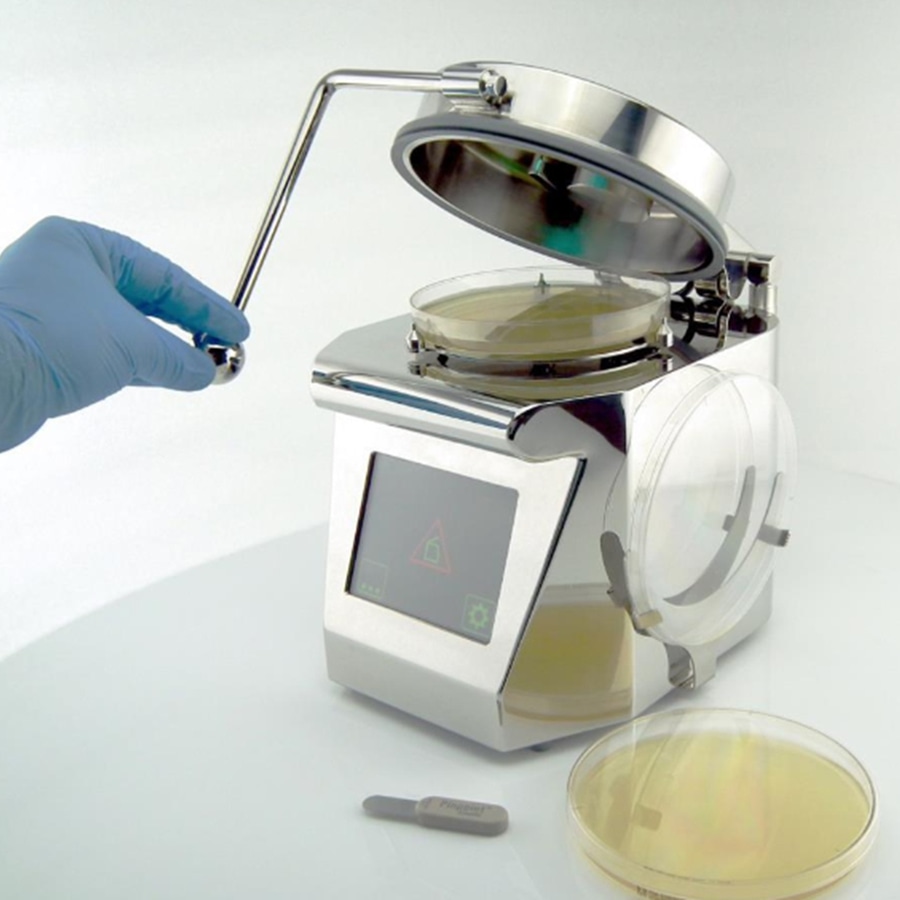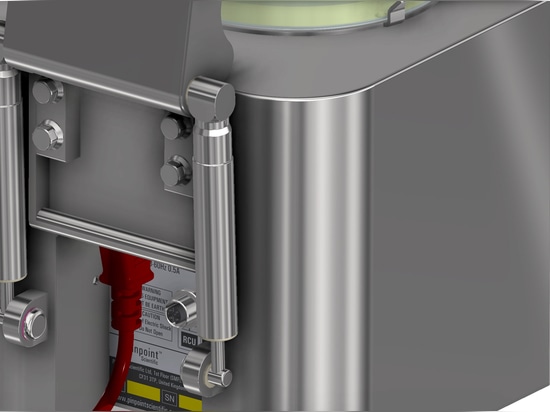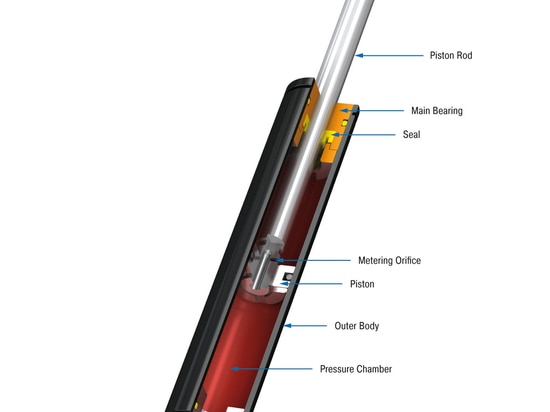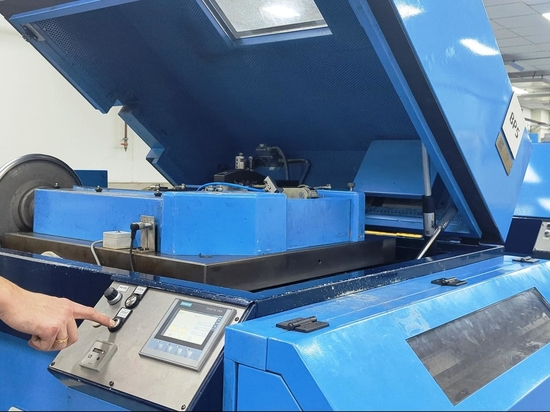
#Product Trends
Hydraulic dampers facilitate operation of active air sampler
Microbiological monitoring and easy handling when taking samples
The environmental monitoring requirements of aseptic processing in the pharmaceutical and healthcare industries have become more and more demanding. To provide laboratories with a new gold standard in microbiological active air monitoring and sampling, the British company Pinpoint Scientific has developed an innovative system. For superior handling the ImpactAir-140 is now equipped with hydraulic dampers provided by ACE Fabreeka UK.
Pinpoint Scientific Ltd. designs and manufactures a range of high-quality microbial environmental monitoring products for pharmaceutical clean rooms and other highly-controlled environments. “We are a technology-driven company and strongly believe in customer involvement throughout our development process to ensure our products meet their exact requirements. Our air and surface samplers were developed with the involvement of two or the largest pharmaceutical companies in the world,” states Gethin Jones, managing director of the globally operating enterprise which is based in Bridgend, Wales, near Cardiff in the UK. Asked about the qualities of the ImpactAir-140, he looks back at the development and says that the company thought it was about time the selection of 140 mm Slit-to-Agar air monitors was brought up to date. Since Pinpoint Scientific believes in developing only the best quality and performance products, ImpactAir has a whole list of advantages over the nearest competitors. The stainless steel construction does not shed particles, offers ultra low vibration and has a universal power supply with less than 50 Watt power consumption, while making operation easy with a large clear touch screen display and a remote control panel option. Fully validated to ISO 14698 for physical and biological efficiency, the system can be equipped with a range of accessories and still boasts only half the footprint and 4 kg less weight than its closest rival. Crucially, and unlike any other sampler of its kind, it has a built-in system that constantly monitors and adjusts the distance between the inlet and the agar surface, a factor which can cause significant performance variation in other samplers. In conclusion, users of ImpactAir work with higher sampling efficiency compared to the reference instruments and the nearest competitor, making it the new gold standard for monitoring and sampling in Class A through to D laboratory environments.
In order to make the daily work in clean-room environments of laboratories in the high-end food sector or medical technology, as well as in the pharmaceutical industry as easy as possible, the designers at Pinpoint Scientific have created a unique solution that has been thought through down to the smallest detail. During their search for high-quality components and while working on improving the operation of the lid with a quality solution for linear motion control the engineers contacted Applied Automation, one of ACE Fabreeka UK’s distributors. After considering all requirements and wishes, their field engineer recommended hydraulic dampers.
Hydraulic dampers filled with special oil for a special solution
Wyn Gordge, Area Manager for ACE Fabreeka UK, describes the initial situation: "We have often worked successfully with our distributor Applied Automation, and in this case study working together quickly led to the desired result for Pinpoint Scientific as well." The decisive point for the use of hydraulic dampers was the customer's request for the lid of the sampler to be opened without any significant effort. Without this requirement, industrial gas springs, which can be precisely adjusted to the desired opening and closing speed by means of a valve that are offered made of stainless steel by ACE, would have been suitable motion control components. However, hydraulic dampers were chosen since they provide a constant feed rate combined with easy adjustability and only have to be tapped lightly to trigger the opening process of the lid. Another plus is the fact that hydraulic dampers enable a gentle closing process with additional damping.
ACE and Applied Automation were able to demonstrate another strong case in point: known as competent development partners and valued for customer-specific solutions, also when initially supplying small quantities, the team achieved a masterpiece of hydraulics. Since the ImpactAir-140 microbial environmental monitoring products are mostly used in critical laboratory conditions and clean-rooms, the use of mineral oil as a damping medium in the cylindrical body of the brake was out of the question according to the specifications from Pinpoint Scientific. Due to this requirement and because of the sensitive areas of application, ACE chose to fill the dampers with a specially refined vegetable oil with a very similar viscosity and service life. In the course of the product design, the engineers at Pinpoint Scientific contributed stainless steel sleeves with which the outer bodies of the hydraulic dampers that are made of coated steel are covered. On the one hand the stainless steel covers enable better hygiene owing to strict clean room requirements and on the other hand the material of the sleeves matches the rest of the unit.
The ACE components featured in this case are HB15-50 type hydraulic dampers with outer body diameters of 15 mm and a stroke of 50 mm which makes them ideally suited to easily open the lid and to keep it at an opening angle of 60 degrees as desired. Coming with variable adjustment of the compressive and extension force between 20 N and 800 N, installing these hydraulic dampers is child's play with the adjustment segment on the piston. Due to their high quality and long service life, there are practically no limits regarding the wishes of customers such as Pinpoint Scientific with regard to the frequency of opening and closing high-end solutions such as ImpactAir-140. When not working in pharmaceutical clean rooms and other highly controlled environments, these top-quality components for precise motion control are primarily used in a wide variety of automotive or industrial constructions, but also in the electronics, furniture and leisure industries.









